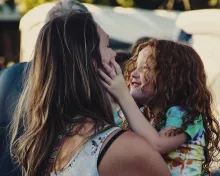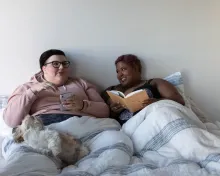
Before you start any counselling with us, we first have to determine if Relate is a good fit for you and the issues you're facing in your relationship. We do this by conducting what we call an Initial Assessment. Everything you need to know about that process can be found here.
Initial Assessment
An initial assessment is the first step in seeking counselling with Relate. This is the process we use to decide if we are best placed to provide you with the help and support you need. The last thing any of us want is to get a couple of sessions in and then realise we’re not the right fit – it’s a waste of your time. An initial assessment helps us prevent that before it becomes an issue.
What happens during an initial assessment?
The initial assessment process will be a bit different depending if you’re attending as an individual or with someone else. For relationship counselling and psychosexual therapy, the initial assessment will always involve some individual time with the counsellor and each person attending, and then some time with the counsellor and both of you together. For example, if you’re looking to attend relationship counselling with your partner your initial assessment would involve three conversations – one between you and your counsellor, one between your partner and your counsellor and one for the three of you together. This is a mandatory part of accessing our services. If you aren’t willing to speak to a counsellor on your own and without your partner present, then unfortunately we aren’t the right fit for you. Obviously this isn’t the case if you want to access individual counselling.
In some centres, these conversations will all take place in separate sessions on different days. In others, all conversations will take place in one extended session. Many centres will allow you to complete an initial assessment over the phone, via Zoom, or face-to-face – depending on your preference. To find out how your Relate centre conducts an initial assessment, it’s best to contact them directly.
If you are wanting family counselling and you have children under 18 who might attend, the initial assessment will only involve their parent(s) or those with parental authority. Initial assessments for children’s counselling (aged between 5 and 10) will always involve a parent or those with parental authority. The process of initial assessments for young people’s counselling (aged between 11 and 25) will vary depending on whether the counselling is taking place in a school or not, and the age and wishes of the young person. Your local Relate centre will explain which assessment will be offered when you contact them.
What will you discuss during an initial assessment?
During these conversations, your counsellor will ask you a series of questions to help them figure out which, if any, of our services are best able to help you. Some people come to us seeking relationship counselling, and during the initial assessment realise sex therapy might be more helpful, for instance.
Sometimes the conclusion of the assessment is that Relate is not the right place for you at the moment. Or it could be that because of other problems in your life, another type of help would be more appropriate. In those cases, we’ll do our best to support you in accessing the right service outside of Relate.
We know that domestic abuse, in its various forms, is a factor in many couple relationships and the impact of this type of unacceptable behaviour to victims, including children, is of huge concern to us. In some cases, after careful assessment, we are able to offer counselling to couples where there is a clear motivation to change and accept responsibility for any past low-level abusive behaviours and where both clients tell us that they wish to stay together. In other cases, where abusive behaviour has become entrenched or constitutes a risk to a partner or any children, it is most likely that a specialist domestic abuse organisation would be more appropriate than counselling and we will provide information about these services.
If there has been some abusive behaviour on your part and you tell us at your assessment that you have already applied to seek help for your behaviour from a specialist accredited programme, we will not offer counselling whilst you are receiving that help. The fact that you are wishing to seek help is absolutely the right step to have taken and when you have completed the full programme, then we may be in a position to offer couple counselling, if you and your partner request it.
Ensuring that victims of domestic abuse obtain the right help and support is a priority for Relate and we prioritise it over the provision of counselling.


